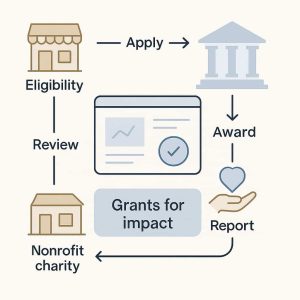 Government grants can be a lifeline for small businesses and charities, funding projects that might otherwise remain ideas on paper. Grants support equipment upgrades, community programs, research initiatives, facility improvements, and public education work, but they are not as simple as applying and waiting for a check to arrive. They follow defined structures, serve very specific funding goals, and come with compliance requirements, reporting rules, and restrictions on how the money can be used. These rules can surprise first-time applicants who expect fast approval or total spending freedom. Understanding the system early helps organizations evaluate fit, prepare properly, and avoid costly missteps. Many small nonprofits turn to guides to build that clarity, including Stand With Main Street resources, which break down business-focused resources to help founders and charity leaders navigate grants and formation decisions with more confidence and less wasted time.
Government grants can be a lifeline for small businesses and charities, funding projects that might otherwise remain ideas on paper. Grants support equipment upgrades, community programs, research initiatives, facility improvements, and public education work, but they are not as simple as applying and waiting for a check to arrive. They follow defined structures, serve very specific funding goals, and come with compliance requirements, reporting rules, and restrictions on how the money can be used. These rules can surprise first-time applicants who expect fast approval or total spending freedom. Understanding the system early helps organizations evaluate fit, prepare properly, and avoid costly missteps. Many small nonprofits turn to guides to build that clarity, including Stand With Main Street resources, which break down business-focused resources to help founders and charity leaders navigate grants and formation decisions with more confidence and less wasted time.
What a Government Grant Actually Is
A government grant is money awarded to support an activity that benefits the public. The key point is that it is not a loan, and you do not pay it back. But it is not free money either. Grants come with strict conditions, reporting expectations, and deadlines. Taxpayers fund them, so agencies want to be sure the money is used precisely as intended.
Small businesses usually receive grants to support innovation, job creation, or community development. Charities often receive grants to deliver public services, expand programs, or support vulnerable groups. In both cases, the goal is impact, not profit.
Who Provides the Grants
Grants can come from several levels of government:
- Federal programs often support research, innovation, technology, and nationwide social initiatives.
- State or regional programs focus on economic development, workforce training, and local services.
- Local government may offer small grants for community projects, events, or neighborhood improvements.
Each level has its own application process, eligibility rules, and funding priorities.
How Eligibility Works
Most applicants discover they do not qualify for far more grants than they do. That is normal. Grants tend to be highly specific. Agencies want to fund a narrow group of organizations doing a narrow set of activities.
Eligibility usually depends on:
- Type of organization. Some grants are only for registered nonprofits. Others are only for for-profit companies.
- Location. Many grants require operations in a specific city, county, or region.
- Purpose. The proposed project must match the grant maker’s priorities.
- Size and structure. Some programs limit applications to microbusinesses or startups. Others require several years of financial history.
If a business or charity does not meet every requirement, the application usually is not worth filing. Grant reviewers rarely make exceptions.
The Application Process
Applying for a grant often involves more work than people expect. Agencies need confidence that you can manage public funds responsibly. That means detailed paperwork and a clear plan.
Most applications include:
-
- A description of your organization. Mission, history, key activities, and who you serve.
- A project proposal. What you want to do, why it matters, and how it aligns with the grant.
- A budget. Exactly how the funds will be used.
- Financial documents. Tax returns, statements, or annual reports.
- Evidence of impact. Past results or projected outcomes.
For many organizations, writing the proposal takes longer than expected. You need to show you understand the problem you are solving and that you have a realistic plan to deliver results.
How the Money Is Distributed
Even after a grant is approved, the funds rarely arrive all at once. Agencies often release money in stages tied to milestones or reporting requirements.
Common payout structures include:
- Reimbursement. You spend first, then submit receipts.
- Scheduled payments. Funds are received quarterly or upon completion of progress reports.
- Partial upfront funding. A portion is provided at the start, followed by later installments.
Charities typically have an easier time raising upfront funds because they are not generating profits. Small businesses often face stricter reimbursement structures.
Reporting and Compliance
Grant money comes with oversight. After receiving funds, you will need to:
-
- Track spending carefully
- Provide progress reports
- Document outcomes
- Follow procurement rules if required
- Keep receipts and financial records
Noncompliance can lead to repayment, penalties, or loss of future funding opportunities. This is the part many new applicants underestimate. A grant is a contract. You promise to carry out a project in a specific way, and the agency expects proof of it.
Why Grants Are Competitive
Grants attract many applicants. Government budgets are limited, and most programs fund only a fraction of proposals. Agencies evaluate applications by looking at:
-
- Strength of the project
- Community or economic impact
- Capacity to deliver
- Budget accuracy
- Alignment with their goals
Strong proposals are focused, realistic, and supported by evidence. Vague ideas rarely win funding.
When a Grant Makes Sense and When It Does Not
A grant is worthwhile when:
-
- You have a clear project with measurable outcomes
- The activity aligns with public benefit
- You are prepared for reporting and oversight
- You can wait months for a decision
A grant is often not a fit when:
-
- You need operating cash
- The project is not fully formed
- You lack financial documentation
- You need funds immediately
Some organizations spend more time applying for grants than delivering services or running their business. It is essential to balance the potential reward with the administrative cost.
Final Thoughts
Government grants can be powerful tools for growth, innovation, and community impact. But they require preparation, structure, and patience. The strongest applicants know what they want to accomplish, understand the rules, and approach funding as a partnership. When used well, grants help small businesses and charities create real, lasting change.

 Many rubbish removal companies offer different pricing structures, such as flat rates or fees based on weight. It’s crucial to do your research and compare options available in your area. Some services might provide inclusive packages, covering everything from pick-up to disposal, while others may charge extra for additional services like sorting or recycling. Understanding these distinctions can help you make a more informed decision that aligns with your budget and needs.
Many rubbish removal companies offer different pricing structures, such as flat rates or fees based on weight. It’s crucial to do your research and compare options available in your area. Some services might provide inclusive packages, covering everything from pick-up to disposal, while others may charge extra for additional services like sorting or recycling. Understanding these distinctions can help you make a more informed decision that aligns with your budget and needs. Once you have narrowed down your options, inquire about the range of services they offer. A rubbish removal Glasgow company provides comprehensive solutions that include not only the collection and disposal of waste but also additional services like recycling and hazardous waste management. It’s important to find a service that matches your specific requirements, especially if you have different types of rubbish that need to be handled differently. Additionally, check if the company offers same-day services or flexible scheduling, as this can be particularly beneficial during urgent cleanouts.
Once you have narrowed down your options, inquire about the range of services they offer. A rubbish removal Glasgow company provides comprehensive solutions that include not only the collection and disposal of waste but also additional services like recycling and hazardous waste management. It’s important to find a service that matches your specific requirements, especially if you have different types of rubbish that need to be handled differently. Additionally, check if the company offers same-day services or flexible scheduling, as this can be particularly beneficial during urgent cleanouts.




 In times of unprecedented uncertainty, a business can be pulled in many different directions. Not only do you have to make strategic decisions that can
In times of unprecedented uncertainty, a business can be pulled in many different directions. Not only do you have to make strategic decisions that can 

 Moving is one of the most exciting as well as most-stressful events in one’s life. While relocating to a new home isn’t an easy task to do, hiring a professional moving company to assist you in your move can make this unforgettable event easier, stress-free as well as enjoyable.
Moving is one of the most exciting as well as most-stressful events in one’s life. While relocating to a new home isn’t an easy task to do, hiring a professional moving company to assist you in your move can make this unforgettable event easier, stress-free as well as enjoyable. Protecting Your Move From Rogue Movers
Protecting Your Move From Rogue Movers You can create the very best articles out there from the standpoint, but it is a competitive arena, and Google takes myriad different variables into consideration when
You can create the very best articles out there from the standpoint, but it is a competitive arena, and Google takes myriad different variables into consideration when 


 Oversee your visitors: The very best way to arrange your business: you ought to first understand what type of people are interested in your kind of music. The perfect way to get this out would be to track the visitors of your site. There are many traffic management tools accessible, that once set up on the site will say about the sort of folks that go to your site, and out of which regions in
Oversee your visitors: The very best way to arrange your business: you ought to first understand what type of people are interested in your kind of music. The perfect way to get this out would be to track the visitors of your site. There are many traffic management tools accessible, that once set up on the site will say about the sort of folks that go to your site, and out of which regions in  Types of Loyalty Rewards Programs
Types of Loyalty Rewards Programs
 Aerial machines
Aerial machines





 There are a variety of scenarios during which you might find it necessary to do this the assistance of a excellent transport firm that would be required and to haul merchandise or some things. There’s not much doubt that in the event that you want to have things the transportation provider that you employ for your job ought to have the right vehicles that are capable of performing these tasks. If the burden is quite high A simple company won’t be enough, and that is where you may wish to head out of your way to discover a transportation business locally.
There are a variety of scenarios during which you might find it necessary to do this the assistance of a excellent transport firm that would be required and to haul merchandise or some things. There’s not much doubt that in the event that you want to have things the transportation provider that you employ for your job ought to have the right vehicles that are capable of performing these tasks. If the burden is quite high A simple company won’t be enough, and that is where you may wish to head out of your way to discover a transportation business locally.